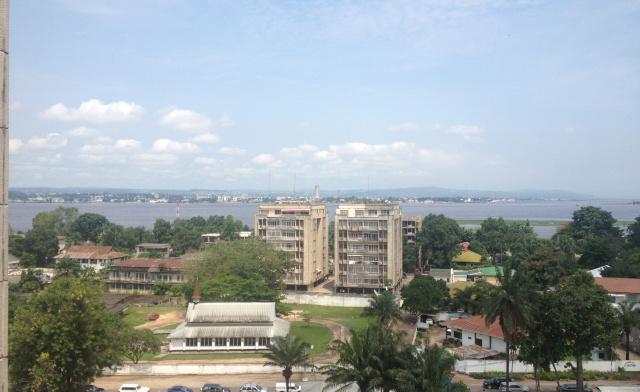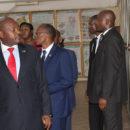THIN-SKINNED QUARRELS: MONUSCO AND HUMANITARIAN ACTION IN THE CONGO – By Christoph Vogel

 Last week, medical humanitarian organisation Médecins Sans Frontií¨res (MSF/Doctors Without Borders) published an op-ed in Congolese newspapers, underlining the need for humanitarian actors to operate in line with neutrality, impartiality, and independence – the humanitarian principles as defined by the International Committee of the Red Cross. The concrete example brought forward by MSF was that MONUSCO should avoid disturbing medical activities in MSF-supported hospitals of eastern Congo. MONUSCO has, after a few days, responded with an astonishingly sharp rebuttal, stating that it was there to protect the Congolese.
Last week, medical humanitarian organisation Médecins Sans Frontií¨res (MSF/Doctors Without Borders) published an op-ed in Congolese newspapers, underlining the need for humanitarian actors to operate in line with neutrality, impartiality, and independence – the humanitarian principles as defined by the International Committee of the Red Cross. The concrete example brought forward by MSF was that MONUSCO should avoid disturbing medical activities in MSF-supported hospitals of eastern Congo. MONUSCO has, after a few days, responded with an astonishingly sharp rebuttal, stating that it was there to protect the Congolese.
The hefty reply by spokesman Monoubai of MONUSCO’s public information section nourishes the suspicion that MONUSCO has actually not completely understood MSF’s claims. Re-reading the op-ed, it is obvious that MSF (as other humanitarians raising concerns over the UN’s peacekeeping mission and its impending intervention brigade, acronymed FIB) did not question MONUSCO as such. On behalf of the MSF movement (comprising all five operational sections working in the east of DRC – Belgium, France, Spain, Holland, and Switzerland), MSF Belgium’s head of mission asks not only MONUSCO, but all conflict parties to respect neutral, impartial, and independent humanitarian action.
Monoubai, MONUSCO’s porte-parole, dismisses MSF’s demands, stating that the UN mission was supposed to aid, protect, and fight. Time to dissect these terms: According to its mandate, the core objectives of MONUSCO, a chapter VII mandated, multidimensional peacekeeping force is supposed to “aid” the DRC government to restore state authority and to “protect” civilians. With the FIB slowly arriving, this special force of 3000 shall also “fight” non-state armed actors, while still lined up in the general chain of command MONUSCO maintains in the DRC. Neither MSF, nor any other humanitarian actor, has asked MONUSCO to either cease support for the government, protect civilians, or withdraw from their plan to engage in offensive combat with non-state armed actors. They merely raise concerns over the way in which MONUSCO’s FIB will tackle militias, the consequences of their attacks (in case they will happen in the near future), and the impact it will have on humanitarian actors.
Thus, Monoubai clearly misses the point in so aggressively refuting the op-ed.
Still, the intricacies of continuing tensions between MONUSCO and the humanitarian world are worth a closer examination: Since MONUC’s time (the predecessor of MONUSCO until 2010), the mission underwent so-called integration (MONUSCO is currently a semi-integrated mission, with the UN’s humanitarian coordination body OCHA maintaining a partly independent role). This means, MONUSCO’s head, the Special Representative of the Secretary-General (SRSG, until recently Roger Meece who is currently being replaced by Martin Kobler) is the overall head of the UN presence in the DRC, including humanitarian, political, developmental, and military entities. He is assisted by a political deputy, a humanitarian-developmental deputy (the two DSRSGs) and the military force commander (currently a Brazilian general). Below, the whole structure onusienne unfolds. This scheme of integration has triggered considerable effects of synergy, as coherence and coordination have without doubt improved (as in other contexts too). However, given that even within the UN family many actors do either not fully understand the concept of integration or hiddenly fight against it for (sub-)organisational interests – which are common to any large body including business – the integration does not work as well as it possibly could.
Unsurprisingly, integration is also a sensitive concept. The UN have conceived a threefold approach to control for the political impact: While in calm settings, full integration (including OCHA) should happen, highly volatile situations should be operated in without the integrated scheme. For cases in between, the semi-integrated scenario is considered adequate. The latter case applies to DRC, widely talked of as post-conflict setting. The reality is different, as Congolese can tell.
However, blaming integration would be far to superficial to grasp the real problem, not least due to the It is not integration as such that lies at the heart of humanitarian concern. Beyond that, there is the so-called cluster system, managed by UNDP and organising activities of different UN agencies (WFP, UNHCR, WHO, etc.) as well as international NGOs (Oxfam, CARE, World Vision, IRC, etc. – most Dunantist actors strictly following the humanitarian principles, like MSF or the ICRC, only observe or completely abstain). Connected to the cluster system is the humanitarian “˜pooled fund’ for the DRC as well as other UN-led financing schemes. Hence, it becomes an area, not only of coordination but also of distribution and subcontracting between different humanitarian actors. Then, there is UNDSS – the UN’s main security organ. While it does not imperatively set rules for UN organisations (as often purported) it is the main, risk-averse actors in a setting where group-think behaviour makes most UN actors rally around the most secure field deployment option. Whenever conflicts flare up in the Congo, this results in either not going to the field or taking armed escorts, as offered by MONUSCO. The structure of the cluster system and the funding mechanisms provides for partnering NGOs that they may have to follow these same regulations when acting as implementing partners for UN agencies.
MONUSCO so far has to some extent, as a semi-integrated mission, to be as impartial as possible (neutrality and independence are categories that do not apply to UN structures by definition, since they are multilateral arrangements spearheaded and funded by a bunch of sovereign states). Still, the close allegiance to the host government – although a central and in some cases potentially useful core value of UN peacekeeping – leading to joint military operations with DRC’s national army, the FARDC, must be regarded as problematic. Not only is FARDC among the main perpetrators of violence and human rights abuses in the DRC – due to numerous rash and crude integration programmes the army at any point of time in the last ten years has included several non-state armed actors that had become part of for usually limited times. MONUC/MONUSCO have thus fought with actors the may before or afterwards attack.
Since March, an offensive brigade, remind of the battlegroup concept, has been decided by the UN Security Council. Staffed with 3000 South African, Tanzanian, and Malawian troops, this part of MONUSCO has the task of “neutralising” non-state armed actors in case the refuse forces disarmament in face of the blue helmets. This is a grand novelty in UN peacekeeping – with only one comparable case so far: MINUSMA in Mali will be supported by the remaining French intervention called “˜parallel force’ and endorsed by the UN Security Council to carry out offensive operations – but not wearing blue helmets. The intervention brigade will come in at a crucial moment, where Kampala peace talks are stalled (while M23 aims at good publicity in openly emphasising these talks but putting up proposals DRC could never accept, the government in turn seems to wait for the brigade to solve problems on their behalf) and many other conflicts newly flare up across North Kivu, South Kivu, Ituri, and North Katanga (more on that in several articles on this site).
Within this framework the yet tense relations between MONUSCO and the humanitarian world gets under additional pressure. While MONUSCO as such plays an important role of deterring conflict parties and providing axis security for circulating humanitarian actors in areas where it is present, the imminent begin of the brigade’s activities will most probably intensify MONUSCO yet established image as a conflict party. M23 has already issued warnings in that regard. If not yet happening, as soon as the brigade will carry out targeted offensive attacks against non-state armed actors the latter will perceive other blue helmets – include those providing escorts to humanitarians – as a legitimate target for retaliation. The consequences for humanitarian access could, in the worst case, be devastating. This alone bears a threat for humanitarian actors which remains difficult to tax prior to the brigade’s operations.
It also bears a substantial threat for humanitarian activities taking place in visible proximity to UN peacekeepers – such as in a case where MONUSCO stations itself next to a hospital in which MSF is providing assistance. This brings us back to the initial matter – a rather valid claim by the so-called French doctors to have their operations not disturbed or influenced by MONUSCO. Certainly not because MSF hates MONUSCO – much more because neutral, impartial, and independent humanitarian action is of immense value in protracted armed conflicts such as the Congolese. And NIIHA – so the acronym of that sort of humanitarian action – is essential for constant negotiation with all conflict parties, be they FARDC, MONUSCO, M23, FDLR, Nyatura, Mayi Mayi, Raia Mutomboki, or any other of the nearly 50 armed groups operating between Aru and Pweto in the DRC.
Christoph Vogel is a Mercator Fellow on International Affairs. He tweets in personal capacity @ethuin and blogs at www.christophvogel.net.


![Three Billboards at a Zimbabwe bus terminal asking: "Abducted at the barber. Still no arrests. How come ED [President Mnangagwa]?" Credit: Baynham Goredema.](https://africanarguments.org/wp-content/uploads/2018/03/zimbabwe-itai-dzamara-130x130.jpg)



